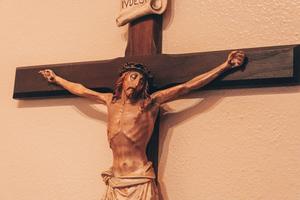Love Is the Law
User’s Guide to Sunday, Oct. 31

Sunday, Oct. 31, is the 31st Sunday in Ordinary Time. Mass Readings: Deuteronomy 6:2-6; Psalm 18:2-4, 47, 51; Hebrews 7:23-28; Mark 12:28-34.
There is a famous story told of Rabbi Hillel, who lived shortly before Jesus’ time, in which he was challenged by a potential convert to teach him the entire Torah while “standing on one foot.” It’s a Jewish way of saying, “Be brief.”
That same theme may be behind the question that is raised today by the scholar of law who asks, “Which is the first of all the commandments?” In answering while “standing on foot,” Jesus recites the traditional Jewish Shema: “Hear, O Israel! The Lord our God is Lord alone! You shall love the Lord your God with all your heart, with all your soul, with all your mind, and with all your strength. Take to heart these words which I enjoin on you today” (Deuteronomy 6:4-6).
Jesus then adds, in common Rabbinic tradition, “The second is like it: You shall love your neighbor as yourself. The whole law and the prophets depend on these two commandments.”
Do not miss the point that the discussion of the greatest “law” centers on the word “love.”
Most of us miss this connection between the law and love.
Particularly in Western culture, we tend to put love and law just about as far apart from each other as any two things can be.
For us, the law is about police officers and courtrooms, about forcing people to do things under threat of some penalty.
Love, on the other hand, is about doing things willingly, because we want to rather than because we have to.
As Jesus insists and the ancient Jewish Shema articulates, love and law are in fact together; the law is an articulation of love.
Thus, when asked about the law, the Lord says that we should love. Yes, love God passionately, with your whole heart, soul and strength. As you do this, you will love what God loves and whom he loves, for this is the natural fruit of love. The more one loves God, the more one begins to love his laws, his vision, what he values.
Yes, all the commandments flow from loving God. And since God loves our neighbors and cares for their welfare, so do we.
The saints say, “If God wants it, then I want it. If God doesn’t want it, then I don’t want it.” Is that the way most of us talk? Many of us say, “How come I can’t have it? It’s not so bad; everyone else does it.” That doesn’t really sound like lovers talking, does it? Somehow the saints knew the law of God and could say it standing on one foot. How about us?
Here, then, is the whole law, standing on one foot: Love God. Let his love permeate you completely, and every other commandment will implicitly flow from this love.
Love does not ask if we have to go to Mass or confession. Love wants to be with God and express joyful gratitude. Love does not wonder whether we must respect each other enough to speak the truth in love or to be men and women of our word. It does not wonder whether it is acceptable to steal from others or to fail to give them what is justly due. It does not wonder whether we should be generous to the poor rather than greedy or whether to be appreciative and satisfied rather than covetous. Love already knows the answer and lives it.
Love is the law, standing on one foot, and all the rest is commentary.
- Keywords:
- msgr. charles pope
- user’s guide to sunday
- user's guide to sunday
- love God
- love others
- love of god, love of neighbor

















